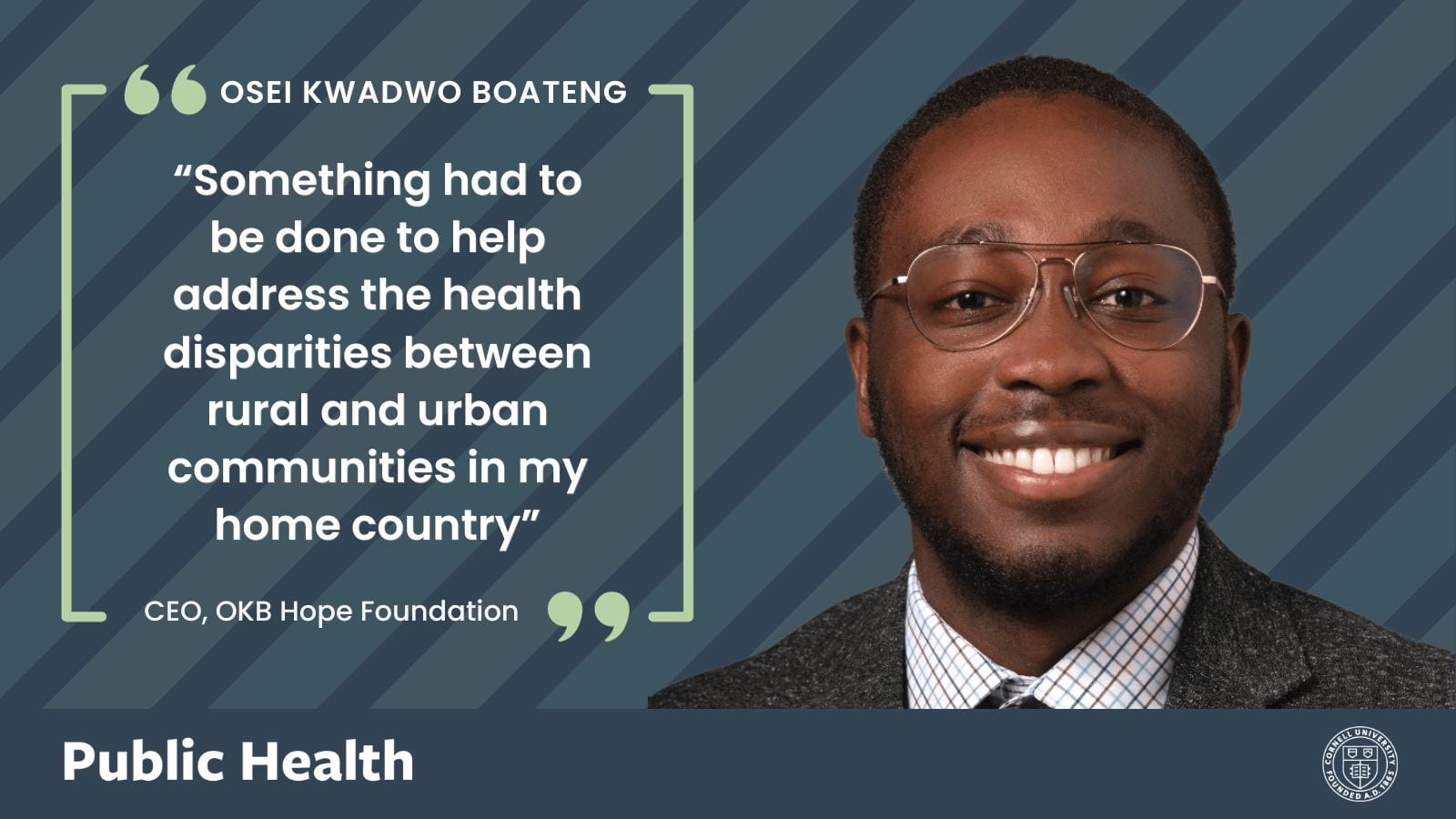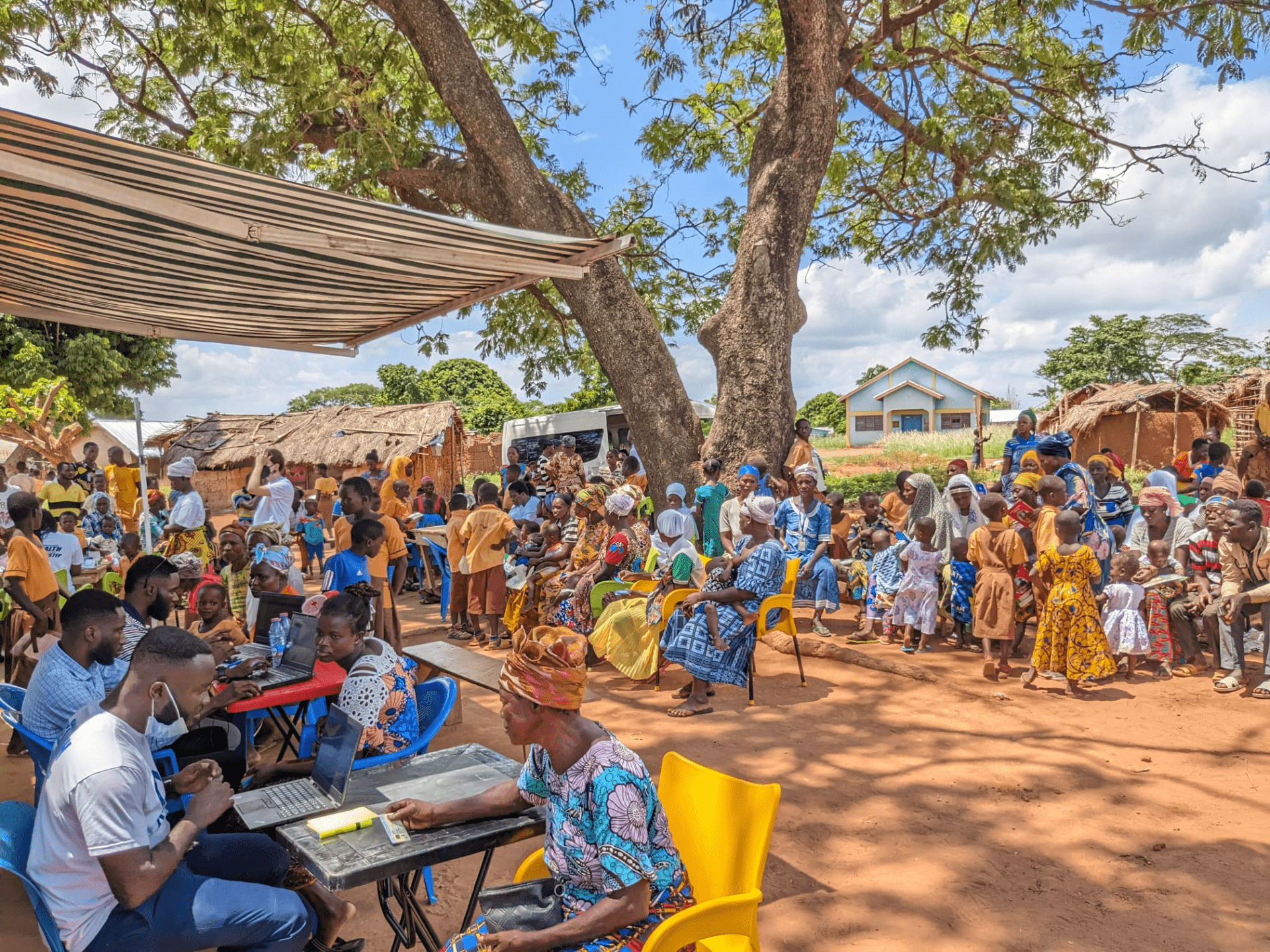Written by: Audrey Baker
Healthcare access in rural Ghana
 Growing up in Ghana, Osei Kwadwo Boateng experienced disparities in rural healthcare infrastructure firsthand. “Someone living in a rural area might walk ten miles or more to a city, just hoping to see a doctor,” he explains. After losing his grandmother—which he says could have been prevented with better access to care for underserved rural communities—Boateng decided to bring healthcare to them.
Growing up in Ghana, Osei Kwadwo Boateng experienced disparities in rural healthcare infrastructure firsthand. “Someone living in a rural area might walk ten miles or more to a city, just hoping to see a doctor,” he explains. After losing his grandmother—which he says could have been prevented with better access to care for underserved rural communities—Boateng decided to bring healthcare to them.
The Hope Health Van, a “one-stop shop hospital” equipped with healthcare providers, a lab technician, point-of-care diagnostic tools, medications, and an electronic medical record system, is the flagship program of the OKB Hope Foundation in Ghana. Since launching in 2022, the Hope Health Van has served over 4000 people across more than 45 communities.
In the Fall of 2022, Boateng wanted input on how to help OKB Hope become more financially sustainable, and connected with Dr. Lorraine Francis, who teaches a community-engaged course on monitoring and evaluation with the Cornell Public Health Program. “When Osei approached me,” says Dr. Francis, “he wanted to expand and serve more people.” She asked him if, instead, he might first focus on strengthening the program, since public health impact is about quality, not just quantity.
Taking the time to respond to the unique needs of fewer communities, says Boateng, has helped create a more sustainable program. “It’s not one size fits all,” he now realizes. OKB Hope is rerouting its resources to “sit down with communities,” assess participant satisfaction, and tailor its services. Before the partnership began, Boateng says, “we were only measuring the numbers”—of communities and people served, and of diseases seen—“but not yet the impact of what we were doing.”
 Since 2022, the Cornell Public Health Program’s partnership with OKB Hope has expanded beyond a single course project. For her capstone, MPH student Margaret Joy Fofo Maison developed a research plan for a knowledge, attitudes, and practices survey study in collaboration with OKB Hope and the University of Ghana. Nia Clements, another MPH student, joined OKB Hope as a grant writer and intern. For her practicum, she is working with Boateng and rural community spiritual leaders to develop a pilot intervention to improve mental health. The project has challenged her to communicate across significant cultural differences, and to practice cultural humility. “Now I know I can work in a space that is unfamiliar, and really listen to my collaborators,” reflects Clements.
Since 2022, the Cornell Public Health Program’s partnership with OKB Hope has expanded beyond a single course project. For her capstone, MPH student Margaret Joy Fofo Maison developed a research plan for a knowledge, attitudes, and practices survey study in collaboration with OKB Hope and the University of Ghana. Nia Clements, another MPH student, joined OKB Hope as a grant writer and intern. For her practicum, she is working with Boateng and rural community spiritual leaders to develop a pilot intervention to improve mental health. The project has challenged her to communicate across significant cultural differences, and to practice cultural humility. “Now I know I can work in a space that is unfamiliar, and really listen to my collaborators,” reflects Clements.
“We are doubling down on mental health,” adds Boateng, due in large part to the impacts of climate change on rural households. Increased flooding has destroyed homes, leading to depression and anxiety, and can prevent the Hope Health Van from reaching communities. To help ensure healthcare access even when roads are blocked, their sustainability plan includes community member trainings and leveraging existing buildings as “health hubs.”
Working with public health students through community-engaged courses, says Dr. Francis, “can help community partners develop different perspectives to improve service delivery.” At the same time, working with different community partners from around the world exposes students to different worldviews and “allows them to become better systems thinkers.” There will be many more opportunities for public health students to work with OKB Hope in the next few years, adds Dr. Francis, hopefully including data collection in Ghana next summer. Beaming a smile, Boateng declares, “we are in it for the long haul with the Cornell Public Health Program!”
Osei Kwadwo Boateng is currently nominated for the “CNN Hero of the Year,”.
